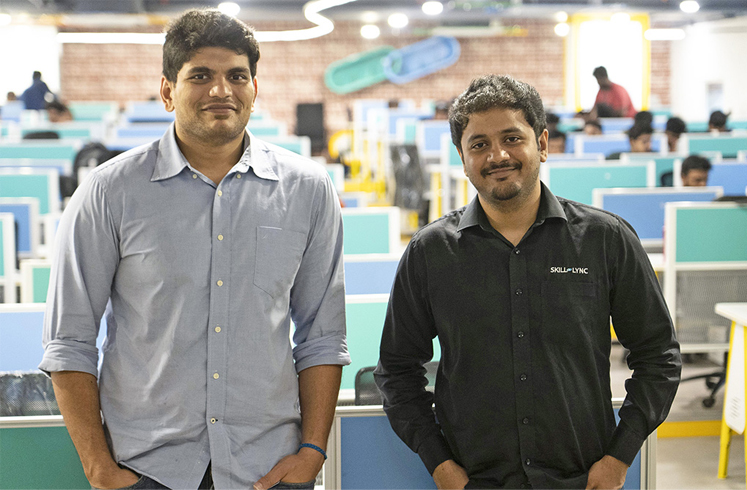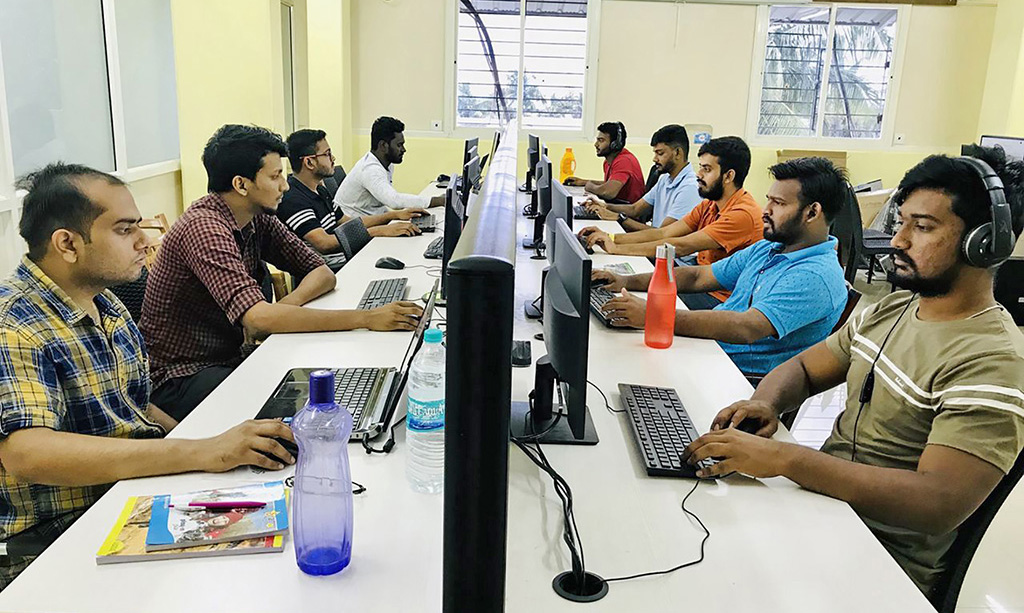
They bring ‘actionable’ hope. They train fresh engineering graduates and upskill those with experience. Skill-Lync was founded to bridge the wide skill gap between industry expectations and education curriculum. Sarada Vishnubhatla talks at length with one of the two founders, Suryanarayanan P, to find out the purpose of Skill-Lync and their plans going ahead.

Skill-Lync was born out of a hard realization. Founded in 2018 by Suryanarayanan P and Sarangarajan Iyengar, Skill-Lync was the personification of their own experience as the postgraduate students of Mechanical Engineering at the University of Wisconsin-Madison. The duo found that the undergraduate course in engineering in India did not impart them with practical knowledge, but was rather more theoretical and grade-oriented. The year was 2012 and since then, they have found the skill gap only widening and thus the seeds for Skill-Lync were sown with the purpose of bridging the skill gap.
Now, 11 years later, Skill-Lync is being recognized by the automotive giants in India as an alternate college that imparts practical skills to fresh engineering graduates.
Suryanarayanan P, Co-Founder, Skill-Lync shares: “Skill-Lync’s strength lies in the fact that we work with industries to understand their requirements and then inculcate them into our course programs. When the students finish the courses, they would have gained the necessary skills and hence become eligible to be hired by the companies.”
Skill-Lync’s students hit the ground running. And according to Suryanarayanan (Surya) there is no dearth of engineering jobs.
He says: “The general perception is that there are not enough jobs in core engineering. Truth is that there are numerous available but one needs to have the right skills to get the right job. India is a booming market and we believe that this is a good time to be an engineer. The automotive industry is always searching for intelligent and skilled engineering talent. If we can upskill our people at a faster pace, not just Indian companies but the entire world will be seeking our engineers.”
Simulating Theory in Reality
The founder duo realized early on that while theoretical fundamentals are important, 80% of the time projects revolve around applying those fundamentals in practical scenarios.
Surya offers an interesting insight: “Skill gap does not exist only in India but is present across the world. And that is why in 2014-15 Saran and I began teaching students of Mechanical Engineering in India digitally in 3-month long courses while still working in the US. We began uploading our course videos on to digital platforms which caught the attention of a few professors, who in turn, wished for us to train their senior mechanical engineering students. Initially we had 30 students from 10 colleges and these were paid classes.”
As their effort began bearing fruit, Surya and Saran registered their company in 2015 in the name of EdXengine.
Surya adds: “I returned to India in 2016 and reached out to colleges and gradually took in top 25 colleges in Tamil Nadu into our fold. In 2018, we rebranded our company to create Skill-Lync and got it registered formally and then started doing pre-recorded courses with live support sessions through live video conferencing calls.”
Weaving The Big Chasm Close
Today educational institutions are becoming aware that companies are not hiring students but they do not know the reason behind it. It is fast becoming passe to think that teaching a tool to the student will enable the candidate to find jobs in the industry. Institutions are slowly realizing that the students need to gain experience working on industry projects while acquiring theoretical knowledge.
Surya shares: “We work closely with companies to help them hire students. Every month, we have 75 placements from our institution with best global companies.”
Today, Skill-Lync boasts of over 150 courses taught by more than 200 experts from all over the world. Their students are taught by the crème de la crème of the industry, who – by the way are remunerated handsomely by Skill-Lync – take keen interest in designing the curriculum along with the founder duo and then also impart teaching.
Surya says further: “We have built a recorded playbook to work with the industry experts so that a student can access the classes irrespective of their location and time. Skill-Lync has 100 engineers to support the students.”
Prior to the pandemic, Skill-Lync had educational centers running in Chennai, Bangalore and Hyderabad. Their plan is to keep them running but in hybrid models post pandemic by making workspace available for students to view the videos and work on assignments.
Skilling and Upskilling
As the popularity of their courses is increasing, more and more colleges are approaching Surya and Saran to fulfill their course requirements. An interesting tidbit is that Skill-Lync’s students get to help the company build more courses.
Surya shares: “We are now strategizing to cater to companies as well as colleges and many of the major companies are working with us already to provide their employees with upskilling opportunities also.”
This means that not only Skill-Lync is teaching students as per industry requirements, the founder partners have also found upskilling as a gap in the existing work scenario in the companies which they are successfully fulfilling already.
Resounding Proof of Success
Proof of the pudding lies in eating. Automotive companies have started recognizing Skill-Lync’s ability to place trained and skilled engineers. Surya cites an example where a global product engineering company in Bangalore has been hiring one out of every 2-3 Skill-Lync’s students interviewed in the last few months.
Surya explains: “All we ask companies is to keep an open mind and give upskilling students a fair opportunity to prove themselves. We see that companies do make the effort because they realize that both our fresh and upskilling students are more capable than even industry professionals with say 2 years of on-job experience.”
He feels proud that their ‘rate of success in placements is 2-3% as compared to the usual rate of 10%’.

Point of Differentiation
Skill-Lync has several USPs up their sleeve and one of them is that their primary focus is to help their students to keep their learning process continuous. Another is that every student, by the end of the course, gets to build a portfolio of their own which comprises industrial projects that they work on.
Surya points out more: “We have 100% placement for those looking for a job because not all of our students look for jobs at the end of it, but some go on to higher studies. In our executive leadership team, we have experts from the industry who bring with them a strong network and partnerships from the automotive segment. Our goal is to provide value to companies and become synonymous with quality.”
Bridge to Future
Skill-Lync’s short-term vision is to partner with maximum companies to understand all of their requirements, and to tailor-make the curriculum in a way that their students succeed in getting a job with these companies.
Surya agrees: “In 5 years, we want to grow from being an institution giving complementary skillset provider to becoming an alternate platform for engineering education.”
The duo’s ultimate dream come true would be when they grow to a level where even a high-schooler can undergo a 3-year course at Skill-Lync, get trained, and find a dream job. And, that would truly be the day when the skill gap between institutions and the academia is bridged.